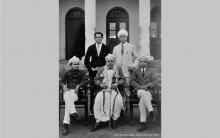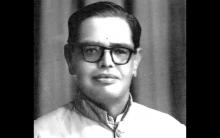While Parivrājaka seems to be miffed, he is also compassionate enough to reconcile that Śāṇḍilya being in this ephemeral world is bound to be behave that way! The verse which describes his rationale while not being as brilliant as Bhartṛhari can well be a part of an extrapolated vairagya collection.
देहो रोगनिधिर्जरावशगतो लीनान्तकाधिष्ठितो
यो नित्यप्रतिघातरुद्धविषयस्तीरे यथा पादपः।
तं लब्ध्वा सुकृतैरनेकगुणितैर्देहात्मना विस्मितो
मत्तो यो बलरूपयौवनगुणैर्देीषान्न तान् पश्यति ॥३॥









